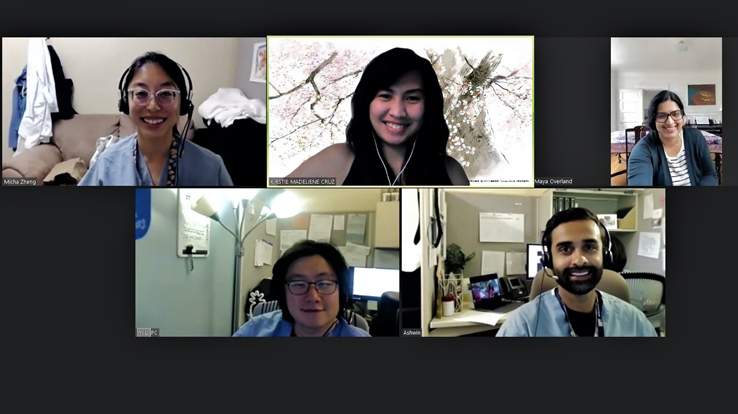Submitted on July 24, 2020
Both mentors and mentees are encouraged to sign up. Click here for more information.
"We have no hope of solving our problems without harnessing the diversity, the energy and the creativity of all our people"
--Roger Wilkins, JD, civil rights activist and journalist
If there is one thing that is consistently true for all UCSFUrology residents through the years: they want to make a difference. The UReTER Mentorship Program (UnderRepresented Trainees Entering Residency) was created by a group of UCSF residents with the blessings and support of residency program directors Lindsay Hampson, MD, MAS; Ben Breyer, MD, MAS; and Alan Shindel, MD, MAS. The goal is to match current residents and fellows with BIPOC (Black, Indigenous, People of Color) and Latinx urology resident applicants to help guide them through the complex maze of the match process.

Micha Y-Z Cheng, MD, MPH, MS, a PGY1 UCSF Urology resident and one of the founders described the process of this program’s birth. “As urology residents, we are inspired and humbled by the #BlackLivesMatter movement. We wanted to do something meaningful. Our response was to create a mentorship program that aims to help increase the number of Black, Latinx, and Indigenous urologists in the US. Our motivation for this became clear when we looked at the numbers. It is clear that the pipeline needs to be expanded.”
The numbers Dr. Cheng cites are sobering. According to the 2019 AUA census, only 2% of urologists identify as Black and only 3.9% identify as Hispanic.
“The need for stronger mentoring early on is imperative in order to get these numbers to move,” says Raj S. Pruthi, MD, MHA, FACS, Professor, UCSF Department of Urology. “One-on-one relationships can be transformative by empowering these students to be stronger applicants and thereby better able to match with the university of their choice. I applaud the residents and program directors, Drs. Breyer, Hampson and Shindel for their creative efforts in starting this program,”
Elements helpful in the interview process are good grades, solid research experience and drive. But, it is sometimes not enough to ace the curriculum. Applicants need to understand and overcome the “hidden curriculum.” Who better to teach that then those who have very recently made the cut?
In an article published by Dove Press,* “Medical student mentoring programs: current insights.” Danielle Nimmons, et al, found that “early career specialists with <10 years of experience can have a great impact on mentees, due to the fact that they are often more able to relate to students’ current personal and professional needs than more senior mentors, and likely to have more up-to-date information on the specialty application and interview process.”
UCSF and Beyond
Although this program was started at UCSF, its intention is to encourage mentors from all over the US, at multiple universities, to join the program. This will give mentees a broad pool from which to select their partners.
The program will have three phases:
- Recruit residents from across the nation to serve as mentors.
- Publicize this program to Black, Indigenous/Native American/Native Hawaiian, and Latinx medical students applying into the 2020-2021 urology residency cycle pair residents with underrepresented medical students to further enhance the pipeline into urology.
- Pair residents with underrepresented medical students to further enhance the pipeline into urology.
Why Diversity Matters
“By creating a workforce that better reflects the patient populations we serve, our field will forge new insights to old problems,” says Dr. Cheng. “Increasing provider diversity is an essential component of addressing disparity in health delivery and outcomes.”
Dr. Pruthi agrees, “If we are going to close the gap in health disparities in our field, we have to open the doors to a more diverse population of urologists. The solutions to this complex issue are going to come from the collective minds of a diverse, highly skilled, socially conscious community. Let this program help to flood our nation with those talents.”
*(Nimmons, Danielle et al. “Medical student mentoring programs: current insights.” Advances in medical education and practice vol. 10 113-123. 4 Mar. 2019, doi:10.2147/AMEP.S154974)